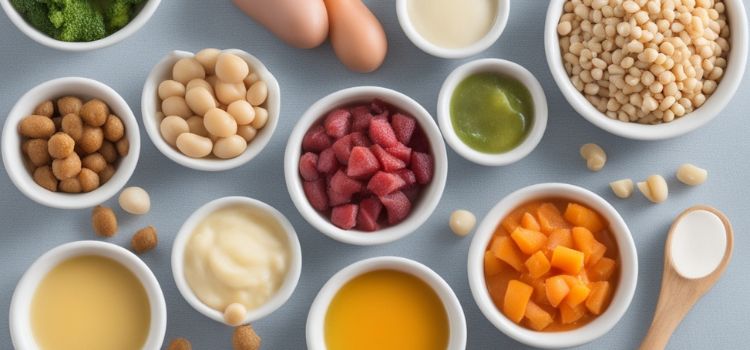Yes, you can let your baby taste food at 4 months. Introducing solid foods to your baby is an exciting milestone, but it’s important to do it at the right time.

At around 4 months, babies start showing signs of readiness for solids, such as being able to hold their head up and displaying interest in what you’re eating. While breast milk or formula should be the primary source of nutrition for the first year, introducing a small taste of pureed fruits or vegetables can help your baby explore new flavors and textures.
However, it’s important to consult your pediatrician before starting solids to ensure that your baby is developmentally ready and to receive guidance on which foods to introduce first.
Understanding The Risks And Benefits
Discover the risks and benefits of introducing solid foods to your 4-month-old baby. Understand the potential impacts on their development and consult with a healthcare professional for personalized advice.

At around four months, many parents start contemplating whether it’s time to introduce solids to their baby’s diet. Understanding the risks and benefits is crucial in making an informed decision. While early food introduction can have its advantages, it’s essential to approach it cautiously to ensure your baby’s well-being.
Let’s explore the guidelines for introducing solids, the potential risks involved, and the expert opinions on this matter.
Food Introduction Guidelines
Recommended Age for Starting Solid Foods:
- The American Academy of Pediatrics recommends starting solids between four to six months.
- Waiting until six months is ideal as it allows the baby’s digestive system to mature fully.
Factors to Consider Before Introducing Solids:
- Consult with your pediatrician to determine if your baby is developmentally ready.
- Consider your baby’s weight gain, head control, and ability to sit up with support.
Signs of Readiness for Solid Foods:
- Physical Indicators: Your baby can hold their head steady and sit with minimal support. They demonstrate increased tongue control and can move food from the front to the back of the mouth.
- Behavioral Cues: Your baby shows interest in what you’re eating and tries to reach for your food. They display reduced tongue-thrust reflex, meaning they don’t automatically push food out of their mouth.
Safest Approaches For Early Food

Breastmilk or Formula as the Primary Source:
- Continue breastfeeding or formula feeding while introducing solids as the primary source of nutrition should still be milk.
- Breast milk or formula provides essential nutrients and establishes a solid foundation for your baby’s overall health.
Introduction of Single Grain Cereal:
- Begin with iron-fortified single grain cereals, such as rice or oats.
- Mix these cereals with breast milk or formula to achieve a runny consistency.
Pureed Fruits and Vegetables:
- Start introducing pureed fruits and vegetables one at a time, allowing for observation of potential allergies or reactions.
- Begin with easily digestible options, like mashed bananas or sweet potatoes.
Potential Risks Of Early Food
- Digestive System Readiness: Early introduction to solids may put stress on an immature digestive system, leading to issues such as constipation or stomach discomfort.
- Food Allergies and Allergic Reactions: Babies under six months are at a higher risk of developing food allergies. Introducing solids too early increases the chances of allergic reactions.
- Choking Hazards: Young babies may not have developed the necessary skills to handle solid foods, putting them at risk of choking.
Expert Opinions On Early Food
- American Academy of Pediatrics Recommendations: The AAP advises waiting until around six months to introduce solids to minimize the risks associated with early food introduction.
- Pediatrician Insights and Research Findings: Many pediatricians share the view that introducing solids earlier than six months can lead to potential health problems, especially for babies who were born prematurely or have specific medical conditions.
Individual Considerations for Babies:
- Preterm or Low Birth Weight Babies: These babies may require adjusted timing for solid food introduction, based on their specific needs and development.
- Babies with Developmental Delays or Medical Conditions: Consult with your pediatrician to ensure a safe and appropriate approach for your baby’s nutritional needs.
Tips For Introducing Solid Foods Safely
- Starting with Small Portions: Begin with a few teaspoons of pureed food to acquaint your baby with the new taste and texture.
- Maintaining a Slow and Gradual Progression: Gradually increase the portion size and variety of foods as your baby adapts to solids. Introduce new foods one at a time, waiting a few days before introducing another.
- Monitoring for Any Negative Reactions: Keep a watchful eye for any signs of allergies or adverse reactions. Seek medical advice if your baby exhibits any concerning symptoms.
The decision to let your baby taste food at four months should be carefully evaluated, considering both the risks and benefits. Following the recommended guidelines, consulting your pediatrician, and being attentive to your baby’s individual needs will help you find the safest approach for their introduction to solid foods.
Remember, a cautious and gradual introduction is key to your baby’s health and enjoyment of new flavors.
Frequently Asked Questions Of Can I Let My Baby Taste Food At 4 Months
Can I Introduce Solid Foods To My Baby At 4 Months?
Introducing solid foods to your baby at 4 months may not be recommended. It is generally recommended to wait until around 6 months to start introducing solid foods to your baby. The American Academy of Pediatrics advises waiting until your baby shows signs of readiness, such as being able to sit up with support and showing an interest in food.
What Are The Risks Of Giving Solid Foods To A 4-Month-Old Baby?
Giving solid foods to a 4-month-old baby can pose risks such as an increased likelihood of choking, an unprepared digestive system, and a higher chance of developing allergies. Waiting until around 6 months allows your baby’s digestive system to develop further and reduces these risks.
How Can I Tell If My Baby Is Ready For Solid Foods?
Signs that your baby may be ready for solid foods include being able to sit up with support, showing an interest in food by watching you eat, and being able to hold their head steady. It’s important to look for these signs before introducing solid foods, typically around 6 months of age.
What Are Some Signs That My Baby Is Not Ready For Solid Foods At 4 Months?
Signs that your baby is not ready for solid foods at 4 months include not being able to sit up with support, pushing food out of their mouth with their tongue, and not showing an interest in food. If these signs are present, it’s best to wait a little longer before introducing solids.
Conclusion
Introducing solid foods to your baby at four months requires careful consideration. While some experts recommend waiting until six months to introduce solids, others suggest starting at four months if the baby shows signs of readiness.
It is important to remember that every baby is different, and it is crucial to consult with your pediatrician before making any decisions. When deciding to introduce solid foods, it is vital to focus on the baby’s developmental readiness, their ability to sit with support, and if they have lost the tongue-thrust reflex.
Additionally, starting with single-ingredient, pureed foods and gradually introducing new flavors and textures is generally recommended.
By following your pediatrician’s advice and closely monitoring your baby’s reactions to solid foods, you can make informed decisions about their nutritional needs and support their healthy growth and development.
Leave a Reply